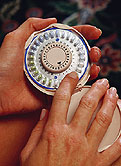
TUESDAY, June 1 (HealthDay News) — For half a century, women have had access to birth control pills. Men? Still waiting.
To date, no one has come up with an equivalent product for men, a male “pill” that would safely block or dramatically reduce sperm production.
Efforts are underway, however. Researchers are exploring potential hormone-based products that would provide effective contraception for men. Getting the product to market, though, could prove challenging.
“They can show that by using products that are already on the market and available, you can achieve the goal of male contraception,” said Diana Blithe, program director for the male contraceptive development program at the U.S. National Institute of Child Health and Human Development. “We know it’s feasible. Whether or not a company will market [it] doesn’t appear to be the case at the moment.”
Research on a male birth control pill has lagged for a number of reasons, said Dr. John K. Amory, an associate professor of medicine at the University of Washington in Seattle.
Partly it’s a matter of biology. The differences between men and women have made it easier to successfully research how to shut down female reproduction, Amory said.
“Women have a period in their life when they’re not fertile, and that’s when they’re pregnant,” he said. “Men don’t have an analogous period in their lives.”
The male reproductive system also is more active. “Men make 1,000 sperm a second. Women make one egg a month, mostly,” Amory said. “It’s harder to suppress that level of production.”
Research has focused on the potential of testosterone to halt sperm production. Doctors have found that when the body is flooded with an excess of testosterone, sperm production halts. “It blocks the signals from the brain to the testes to create sperm,” Amory said. Excess testosterone often causes sterility in male bodybuilders, he noted.
Other studies have looked into using progestin, a synthetic hormone used in female contraceptives, Blithe said.
“You’re shutting down the body’s normal production of testosterone,” she said. “When you do that, you shut it down in the testes, but you also shut it down in the blood. But if you don’t replace the concentration in the blood, a lot of other things get turned off, such as libido, ability to achieve erection and building muscle mass.”
Attempts to create an oral pill using testosterone to shut down sperm production have not worked because the body absorbs the male hormone before it can get the job done. “It gets metabolized pretty aggressively by the liver,” Amory said.
However, studies have found success through injecting the hormones or applying them through the skin.
Chinese researchers, for instance, have shown that injectable testosterone can be effective in male birth control. Once a month for 30 months, the doctors injected 1,045 healthy, fertile Chinese men, 20 to 45 years old, with 500 milligrams of testosterone undecanoate mixed in tea seed oil.
The contraception proved effective, with a pregnancy rate of just 1.1 per 1,000 men in a two-year span. Additionally, the men reported no serious side effects and returned to normal fertility after they stopped taking the injections. The findings were published last June in the Journal of Clinical Endocrinology & Metabolism.
Amory is part of a research team investigating another means of hormonal birth control for men — a gel that would be applied to the skin. The team is enrolling men for the study, and results could be more than a year away.
Though both are promising avenues of research, Amory warned that people shouldn’t get their hopes up about a male “pill” anytime in the near future.
“Everybody’s been saying, ‘within the next five years,’ for the last 30 years,” he said.
More information
The U.S. Food and Drug Administration has more about existing methods of birth control.

